| Listing 1 - 10 of 22 | << page >> |
Sort by
|
Book
Year: 1997 Publisher: Cambridge ; New York, NY : Cambridge University Press,
Abstract | Keywords | Export | Availability | Bookmark
 Loading...
Loading...Choose an application
- Reference Manager
- EndNote
- RefWorks (Direct export to RefWorks)
SOCIAL CHOICE --- ECONOMICS --- PUBLIC CHOICE --- SOCIAL CHOICE --- ECONOMICS --- PUBLIC CHOICE
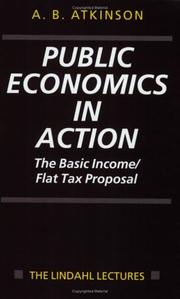
ISBN: 0198292163 Year: 1997 Publisher: Oxford : Oxford University Press,
Abstract | Keywords | Export | Availability | Bookmark
 Loading...
Loading...Choose an application
- Reference Manager
- EndNote
- RefWorks (Direct export to RefWorks)
Income tax --- Flat-rate income tax --- Social security --- -Guaranteed annual income --- Social choice --- Finance
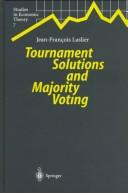
ISBN: 3540628975 9783540628972 Year: 1997 Volume: 7 Publisher: Berlin Springer
Abstract | Keywords | Export | Availability | Bookmark
 Loading...
Loading...Choose an application
- Reference Manager
- EndNote
- RefWorks (Direct export to RefWorks)
Social choice --- Game theory --- Mathematical models --- 519.2 --- Probability. Mathematical statistics --- 519.2 Probability. Mathematical statistics --- Decision making --- Voting --- Polls --- Elections --- Politics, Practical --- Suffrage --- Games, Theory of --- Theory of games --- Mathematics --- Balloting --- Social choice - Mathematical models
Book
ISBN: 9054871636 9789054871637 Year: 1997 Publisher: Brussel VUBPress
Abstract | Keywords | Export | Availability | Bookmark
 Loading...
Loading...Choose an application
- Reference Manager
- EndNote
- RefWorks (Direct export to RefWorks)
Political philosophy. Social philosophy --- Individuation (Philosophy). --- Privacy. --- Social choice. --- Individuation (Philosophy) --- Privacy --- Social choice --- Academic collection --- #A9710A --- Choice, Social --- Collective choice --- Public choice --- Choice (Psychology) --- Social psychology --- Welfare economics --- Secrecy --- Solitude --- Individuals (Philosophy) --- Individuation --- Particulars (Philosophy) --- Philosophy --- Haecceity (Philosophy)
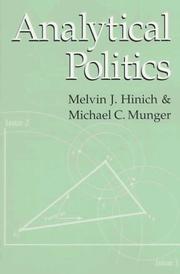
ISBN: 0521562872 0521565677 113917472X Year: 1997 Publisher: Cambridge : Cambridge University Press,
Abstract | Keywords | Export | Availability | Bookmark
 Loading...
Loading...Choose an application
- Reference Manager
- EndNote
- RefWorks (Direct export to RefWorks)
To 'analyse' means to break into components and understand. But new readers find modern mathematical theories of politics so inaccessible that analysis is difficult. Where does one start? Analytical Politics is an introduction to analytical theories of politics, explicitly designed both for the interested professional and students in political science. We cannot evaluate how well governments perform without some baseline for comparison: what should governments be doing? This book focuses on the role of the 'center' in politics, drawing from the classical political theories of Aristotle, Hobbes, Rousseau, and others. The main questions in Analytical Politics involve the existence and stability of the center; when does it exist? When should the center guide policy? How do alternative voting rules help in discovering the center? An understanding of the work reviewed here is essential for anyone who hopes to evaluate the performance or predict the actions of democratic governments.
Politics --- Political science --- Social choice --- Voting --- Polls --- Elections --- Politics, Practical --- Suffrage --- Choice, Social --- Collective choice --- Public choice --- Choice (Psychology) --- Social psychology --- Welfare economics --- Administration --- Civil government --- Commonwealth, The --- Government --- Political theory --- Political thought --- Science, Political --- Social sciences --- State, The --- Political science. --- Social choice. --- Voting. --- Social Sciences --- Political Science --- Balloting
Book
ISBN: 8872190320 9788872190326 Year: 1997 Publisher: Torino,
Abstract | Keywords | Export | Availability | Bookmark
 Loading...
Loading...Choose an application
- Reference Manager
- EndNote
- RefWorks (Direct export to RefWorks)
Austrian school of economics. --- Liberalism. --- Social choice. --- Austrian school of economics --- Liberalism --- Social choice --- Choice, Social --- Collective choice --- Public choice --- Choice (Psychology) --- Social psychology --- Welfare economics --- Liberal egalitarianism --- Liberty --- Political science --- Social sciences --- Austrian school of economists --- Marginalist school of economics --- Schools of economics --- Marginal utility
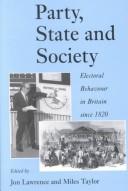
Abstract | Keywords | Export | Availability | Bookmark
 Loading...
Loading...Choose an application
- Reference Manager
- EndNote
- RefWorks (Direct export to RefWorks)
History of the United Kingdom and Ireland --- anno 1800-1999 --- Elections --- Voting --- Polls --- Politics, Practical --- Social choice --- Suffrage --- History --- Great Britain --- Politics and government --- 20th century --- 19th century --- Elections - Great Britain - History. --- Voting - Great Britain - History. --- Balloting
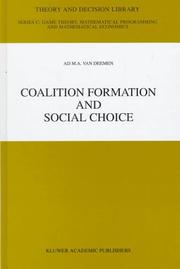
ISBN: 0792347501 1441947817 1475725787 Year: 1997 Volume: 19 Publisher: Dordrecht Kluwer Academic
Abstract | Keywords | Export | Availability | Bookmark
 Loading...
Loading...Choose an application
- Reference Manager
- EndNote
- RefWorks (Direct export to RefWorks)
Coalition Formation and Social Choice provides a unified and comprehensive study of coalition formation and collective decision-making in committees. It discusses the main existing theories including the size principle, conflict of interest theory, dominant player theory, policy distance theory and power excess theory. In addition, the book offers new theories of coalition formation in which the endogenous formation of preferences for coalitions is basic. Both simple game theory and social choice theory are extensively applied in the treatment of the theories. This combined application not only leads to new theories but also offers a new and fresh perspective on coalition formation and collective decision-making in committees. The book covers the fundamental concepts and results of social choice theory including Arrow's Impossibility Theorem. Furthermore, it gives a coherent treatment of the theory of simple games. Besides more traditional topics in simple game theory like power indices, it also introduces new aspects of simple games such as the Chow parameter, the Chow vector and the notion of similar games.
Microeconomics --- Operational research. Game theory --- Social choice --- Mathematical models --- Coalition (Social sciences) --- Economic theory. --- Econometrics. --- Economic Theory/Quantitative Economics/Mathematical Methods. --- Economic theory --- Political economy --- Social sciences --- Economic man --- Economics, Mathematical --- Statistics
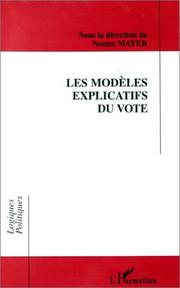
ISBN: 2738452442 9782738452443 Year: 1997 Volume: *1 Publisher: Paris Montréal L'Harmattan
Abstract | Keywords | Export | Availability | Bookmark
 Loading...
Loading...Choose an application
- Reference Manager
- EndNote
- RefWorks (Direct export to RefWorks)
Voting research --- Elections --- Voting --- Sociologie électorale --- Vote --- Research --- Recherche --- France --- Politics and government --- Politique et gouvernement --- Sociologie électorale --- Polls --- Politics, Practical --- Social choice --- Suffrage --- Voting behavior research --- Vote - Recherche - France. --- Voting - France. --- Voting research - France.
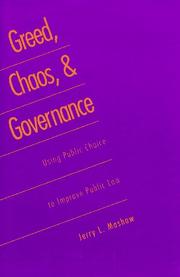
ISBN: 0585361177 9780585361178 9780300147421 0300147422 0300066775 0300078706 9780300066777 Year: 1997 Publisher: New Haven Yale University Press
Abstract | Keywords | Export | Availability | Bookmark
 Loading...
Loading...Choose an application
- Reference Manager
- EndNote
- RefWorks (Direct export to RefWorks)
Public choice theory should be taken seriously-but not too seriously. In this thought-provoking book, Jerry Mashaw stakes out a middle ground between those who champion public choice theory (the application of the conventional methodology of economics to political science matters, also known as rational choice theory) and those who disparage it. He argues that in many cases public choice theory's reach has exceeded its grasp. In others, public choice insights have not been pursued far enough by those who are concerned with the operation and improvement of legal institutions.While Mashaw addresses perennial questions of constitutional law, legislative interpretation, administrative law, and the design of public institutions, he arrives at innovative conclusions. Countering the positions of key public choice theorists, Mashaw finds public choice approaches virtually useless as an aid to the interpretation of statutes, and he finds public choice arguments against delegating political decisions to administrators incoherent. But, using the tools of public choice analysts, he reverses the lawyers' conventional wisdom by arguing that substantive rationality review is not only legitimate but a lesser invasion of legislative prerogatives than much judicial interpretation of statutes. And, criticizing three decades of "law reform," Mashaw contends that pre-enforcement judicial review of agency rules has seriously undermined both governmental capacity and the rule of law.
Legislation --- Administrative procedure --- Social choice --- Law - U.S. --- Law, Politics & Government --- Constitutional Law - U.S. --- Legislative process --- Law --- Choice, Social --- Collective choice --- Public choice --- Choice (Psychology) --- Social psychology --- Welfare economics
| Listing 1 - 10 of 22 | << page >> |
Sort by
|

 Search
Search Feedback
Feedback About UniCat
About UniCat  Help
Help News
News